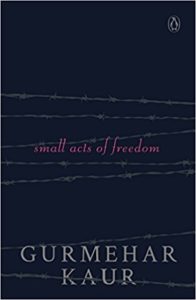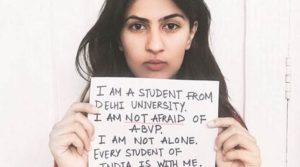Gurmehar Kaur’s “Small Acts of Freedom”
 ‘That is not how friendships work and that is not how you win people. You can’t win with authority or dictatorship. You don’t want to be feared; you want to be loved and being loved is so much more a happier feeling than fear.’
‘That is not how friendships work and that is not how you win people. You can’t win with authority or dictatorship. You don’t want to be feared; you want to be loved and being loved is so much more a happier feeling than fear.’
That day I learnt one of the most important lessons of my life: my father’s weapons may have been guns and ammunition, but my weapons had to be peace. Always.
Gurmehar Kaur, an undergraduate student at University of Delhi, “shot to fame” when she started a  protest against the ruling nationalist party Bharatiya Janata Party’s (BJP) student wing, Akhil Bharatiya Vidyarthi Parishad (ABVP), who had behaved violently and disrupted a seminar being held at Ramjas College [in February 2017]. She posted a picture of herself on a social media site holding up a placard that read: “I am a student of Delhi University. I am not afraid of the ABVP. I am not alone. Every student of India is with me.”’ ( #studentsagainstABVP ) Overnight this petite, poised and soft-spoken student became the face of the student protests. Being the daughter of an Army officer who had been killed in the Kargil war when she was a toddler and speaking of peace was completely unacceptable to the fundamentalists. It unleashed a series of horrific abuse directed at this young girl. She was threatened with rape, she was trolled, right wing sympathisers mocked her and she was even compared to the most wanted terrorist in India, Dawood Ibrahim. All this was completely uncalled for but was in keeping with the nationalist fervour espoused by the “nationalists”. ( Scroll, 7 Feb 2018, “The abuse of soldier’s daughter Gurmehar Kaur shows that Savarkarite nationalism is on the rise” )
protest against the ruling nationalist party Bharatiya Janata Party’s (BJP) student wing, Akhil Bharatiya Vidyarthi Parishad (ABVP), who had behaved violently and disrupted a seminar being held at Ramjas College [in February 2017]. She posted a picture of herself on a social media site holding up a placard that read: “I am a student of Delhi University. I am not afraid of the ABVP. I am not alone. Every student of India is with me.”’ ( #studentsagainstABVP ) Overnight this petite, poised and soft-spoken student became the face of the student protests. Being the daughter of an Army officer who had been killed in the Kargil war when she was a toddler and speaking of peace was completely unacceptable to the fundamentalists. It unleashed a series of horrific abuse directed at this young girl. She was threatened with rape, she was trolled, right wing sympathisers mocked her and she was even compared to the most wanted terrorist in India, Dawood Ibrahim. All this was completely uncalled for but was in keeping with the nationalist fervour espoused by the “nationalists”. ( Scroll, 7 Feb 2018, “The abuse of soldier’s daughter Gurmehar Kaur shows that Savarkarite nationalism is on the rise” )
Gurmehar Kaur dropped out of the Ramjas student protest campaign but her inherent belief in peace building measures is the best way forward in such adverse times, divided opinion. Many commended Gurmehar Kaur for speaking wisely while many others bayed for her blood. It did not deter her and she continues to promote free speech. So much so that in October 2017, TIME magazine featured her in their list of next generation of leaders 2017. She was called a “free speech warrior”. Probably given the worldwide sensation she had become Gurmehar Kaur was offered a book contract by Penguin Random House India to write her story.
Small Acts of Freedom was published recently. It is a slim memoir. Although in her introduction to the book she recounts her involvement in the Ramjas college protests but chooses not to mention it at all in later chapters. Instead she prefers to dwell upon the incidents preceding the incident. Her life as that of a two-year-old girl and a younger sister brought up by a widowed mother and a maternal grandmother. How desperately they miss their father/husband but their mother ensures his memory is kept alive. It is a well-written account by a young woman who has been catapulted into the limelight and has had to learn to mature rapidly as an adult. Yet the simple language used and at times the wide-eyed wonder about her memories such as that of her grandmother hiding the chocolates indicates how close she is still in years to her childhood. She grew up in Punjab, a state which had been worst affected by the violence of Partition in 1947, and whose repurcussions were being felt decades later. In the 1990s Punjab was terribly affected by the separatist Khalistan movement and it had disrupted civil society considerably. Violence was all around. It was in this atmosphere that Gurmehar spent her childhood, listening to vicious talk of the adults spewing hatred particularly towards Pakistan, when it was her father who had been martyred in the war against Pakistanis and he was the one who had inculcated in his daughter the love for peace.
Gurmehar Kaur lacks the perspective ( which comes with age and experience) and tools of academic discourse to dissect and analyse why she did what she did in February 2017 but her firm resolve to do what is best as her upbringing has taught her is what shines through in Small Acts of Freedom. The curious structure of the text with its shifting points of view is very smartly done. To capture these shifts in voices and different tenses is either a class act by a master craftsman or it is simply who she is, wanting to accommodate the important women in her life. The chapters too alternate between different decades — her mother’s childhood and marriage in ’70s and ’80s– to what Gurmehar remembers of her life in late ’90s. Laying down in words a narrative which is so complicated like this while allowing it to flow seamlessly is an astounding feat in one so young. At times it seems as if the story is moving chronologically when it is suddenly disrupted seemingly while the main narrative goes off at a tangent — much as if this tale is being narrated orally with tiny stories embedded within it.
All said and done it is a readable book highlighting what Gurmehar Kaur has learned at home as well as learned to overcome slights at her expense. It is a timely book since Gurmehar Kaur is perceived as the face of student protests in Delhi but she is also an icon for the youth, a messenger of peace and hope.
Read it.
Gurmehar Kaur Small Acts of Freedom Penguin Books, India, 2018. Pb. pp. 200 Rs. 299
7 February 2018

No Comments